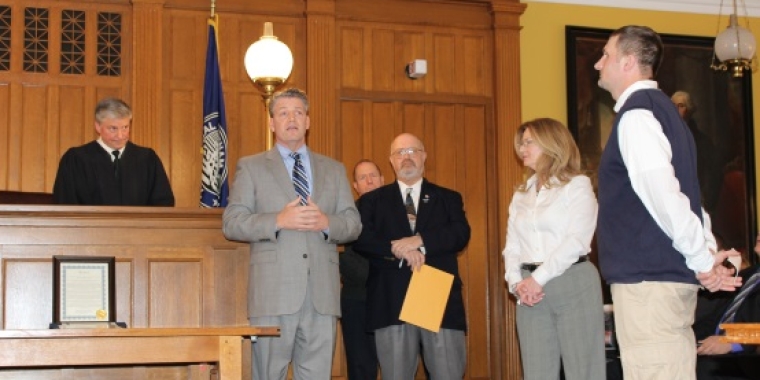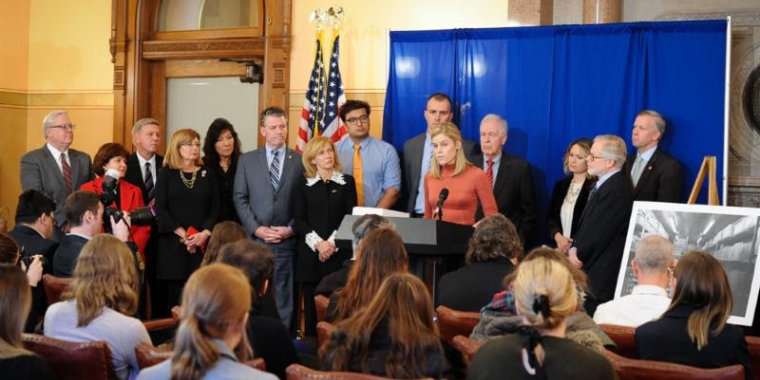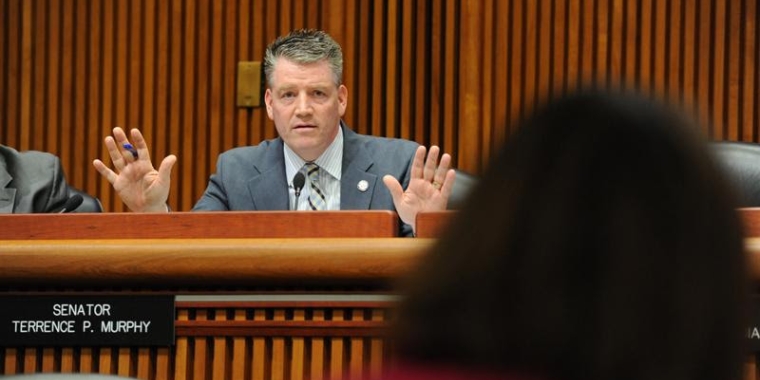Gov. signs Murphy's bill expanding drug treatment court access
Terrence P. Murphy
September 29, 2015
-
COMMITTEE:
- Heroin Task Force

ALBANY, NY - September is national recovery month and a new law signed by Governor Andrew Cuomo this week is being hailed by recovery providers and advocates as a major victory in New York's continued efforts to curb addiction. The signing of S.4239B/A.6255B, authored by State Senator Terrence Murphy, will now allow recovering addicts to enter judicial diversion programs, better known as drug courts, while obtaining medically prescribed treatment.
"This was a common sense, bipartisan initiative, that I was proud to carry in the Senate and thank Governor Cuomo for signing it into law," Senator Murphy said. "New York's drug courts have saved countless lives from the scourge of addiction. By expanding those who qualify for this lifesaving program, New York no longer denies this opportunity to those relying on maintenance medications as part of their recovery. This signifies another win in our continuing war against addiction."
As of August 1, 2014 New York had established 146 drug courts of which 90 were in criminal court, 35 in family court, 6 in town and village courts and 15 focused on juveniles. It is estimated these courts had more than 85,000 participants with a success rate of nearly 50 percent.
The passage of this bill has been applauded by not-for-profits across the State including Vocal New York, the Drug Policy Alliance, Coalition of Medication-Assisted Treatment Providers and Advocates (COMPA), The Coalition of Behavioral Health Agencies, Inc., and Alcohol and Substance Abuse Providers.
"New York, like many other states, is battling an opioid addiction crisis," Assemblymember Linda Rosenthal, chair of the Assembly Committee on Alcoholism and Drug Abuse said in a statement. "This law will ensure that drug-addicted defendants are not forced to choose between life-saving medication and participating in drug courts. After working closely with Vocal-NY, the Drug Policy Alliance and others, I am pleased that the Governor signed this bill into law - it will help to save countless lives and keep many others out of jail."
Senator Kemp Hannon, Chairman of the Senate's Health Committee and a co-sponsor of this legislation explained, "Medication assisted treatment is one of the tools available to treat opioid addiction. Ensuring that this tool or treatment modality can be used while an individual is in a drug court ordered judicial diversion program. as this legislation does, is essential if we are to get a handle on the current heroin crisis. I commend the governor for signing this legislation into law."
Earlier this year, Senator Murphy was appointed as a co-chairman of the New York State Senate Task Force on Heroin and Opioid Addiction. During hearings across the State, there are numerous benefits of drug court programs, according to testimony from Putnam County Judge Jim Reitz who oversees Putnam County's drug court program.
Judge Reitz said, "This is a major step in the right direction to help people. I fully support this measure which will give folks a second chance to turn their lives around while holding them accountable for their actions."
Senator George Amedore, co-chair of the New York State Senate's Task Force on Heroin and Opioid Abuse said, "We need to do everything possible to ensure better outcomes for those who are struggling with addiction. Many have found the path to recovery through medically assisted treatment, and with this new law, we are ensuring they will be allowed to participate in judicial diversion programs while having access to the treatment plan they need at the same time."
Yesterday, New York State and city law enforcement seized $30 million worth of heroin in lower Westchester and the Bronx. The 141 pounds of heroin were found in three separate locations including a Jeep Cherokee, apartment in the Bronx and a storage facility in Yonkers.
Senator Rob Ortt, who also serves as the co-chairman of the task force said, "Drug courts are one of our most valuable tools to protect our communities, avoid costly incarcerations and help drug addicts. This law will introduce uniformity across our state and expand the effectiveness of drug courts. Our method of treating addiction needs to conform to the nature of today's heroin and opioid epidemic, and it needs to account for developments in modern medicine; this law will take an important step toward achieving both."
Senator Phil Boyle, who served as a sponsor of the bill said, "Substance abuse is a disease. This looming heroin epidemic is the chilling reality of what happens when those caught up in the criminal justice system are not treated as such. We have a profound opportunity to change the paths of those addicted while in a controlled environment, thereby breaking a deadly cycle for many. This legislation ensures that those found in the criminal justice system for crimes associated with heroin use receive treatment for their addiction while complying with the law. I applaud Senator Murphy and the members of the Heroin Task Force for their vision and support in creating purposeful laws that truly make a difference in people's lives."
The passage of this legislation marks the first statewide bill for Senator Murphy in only his first year serving as State Senator.



